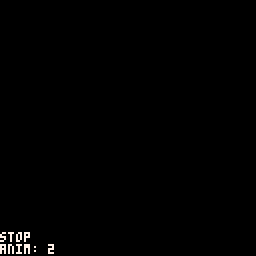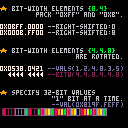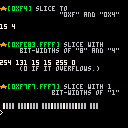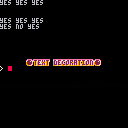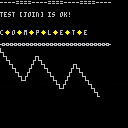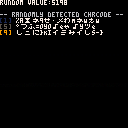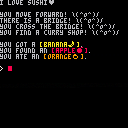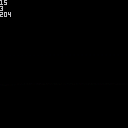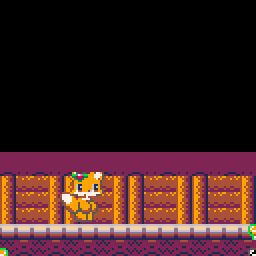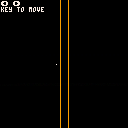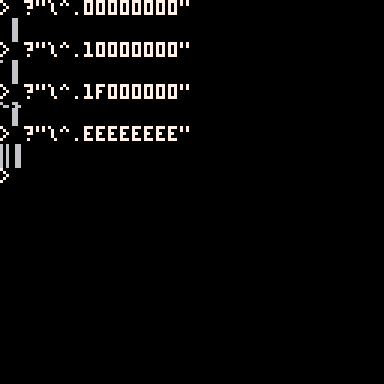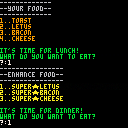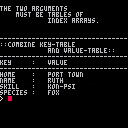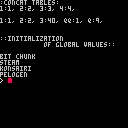Feature Overview
STRDSUM() sums two numerable strings.
- The number of digits it can handle exceeds the 32-bit limit. (Probably as long as the system will allow.)
- Match the string length to the longer of the two arguments.
- Negative values and values after the decimal point cannot be handled.(Insert a period in the output result.)
- This function consumes 63 Token.
This code may cause errors in versions prior to 0.2.5c.
?strdsum('32768','32768') -- 65536
?strdsum('500','000500') -- 001000
?strdsum('900109','123456') -- 1023565
|

Hello @zep
One of my game players reported this.
It seems that Pico8 games downloaded from Steam sometimes fail to start when a controller is connected.
Target game in which the bug occurred.
https://store.steampowered.com/app/1448220/KONSAIRI/
Running environment
- Apple silicon Mac.
- Gamepad "Sony PlayStation® DualSense™ Wireless Controller" ----STORE PAGE.
- Using Steam's controller linkage function (Bluetooth).
- Exported cart pico8 version 0.2.2c (also occurs in 0.2.5e)
Crash report
https://docs.google.com/document/d/1u615ThHWhl_YEK8agfgb5EENnyzfXKkhnk_ach4XDgA/edit?usp=sharing
Thank you for your cooperation.

Feature Overview
BPACK() pack the value of the bit specification with bit width.
- If multiple bit values are specified, pack toward the most significant bit.
- To start bit packing from the decimal point bit, set [number s] to a negative value.
- If there are fewer bit width elements for the value to pack, the bit width elements are rotated.
- This function consumes 38 Token.
v=bpack({8,4},0,0xff,0xb)
?tostr(v,1) -- 0x0bff.0000 (bit-left-shift:0)
v=bpack({8,4},4,0xff,0xb)
?tostr(v,1) -- 0x0bff.0000 (bit-left-shift:4)
|
This function is included in the KNUTIL library.
release note
Feature Overview
BUNPACK() slice the value with bit width.
- by specifying the argument after [number w], a value of up to 32 bits can be sliced.
- set [number s] to a negative value to start the slicing from the decimal point bit.
- This function consumes 30 Token.
a,b=bunpack(0xf8,0,4,4) -- Value, First bit-shift, bit-width, ...[bit-width] ?a -- 8 (0x8) ?b -- 15 (0xf) |
This function is included in the KNUTIL library.
release note
Feature Overview
TBFILL() Create a table by specifying an index number.
- Create the table with the specified minimum and maximum indices and fill it with the value of the first argument.
- Multi-dimensional tables can be created by adding minimum and maximum arguments.
- This function consumes 30 Token.
-- one-dimensional table
t=tbfill('yes',1,3)
?t[1]..' '..t[2]..' '..t[3].."\n\n"
-- two-dimensional table
t=tbfill('yes',1,2,1,3)
t[2][2]='no'
?t[1][1]..' '..t[1][2]..' '..t[1][3]
?t[2][1]..' '..t[2][2]..' '..t[2][3]
|
This function is included in the KNUTIL library.
Feature Overview
JOIN() Join strings with a delimiter.
- Joins the argument strings with the specified delimiter.
- This function consumes 25 Token.
?join('====','----','----','----','----\n')
?join(' ',unpack({'test','[join]','is','ok!\n\n'}))
?join('\fa◆\f6','c','o','m','p','l','e','t','e\n')
?join('\-e=\-e',unpack(split('----------------------------','')))
|
This function is included in the KNUTIL library.
release note



Feature Overview
TTABLE() returns the table if the argument is a table.
- Returns FALSE if not a table.
- Use when table or string determination is required.
- e.g., when using a string for initialization and replacing it with a table
- Simultaneously check the type and reference the contents inline, as in
type(tbl)=='table' and tbl.
- This function consumes 10 Token.
tbl = '1 5 10' -- Default value.
tbl = ttable(tbl) or split(tbl, ' ') -- tbl = {1, 5, 10}
----
----
-- Thereafter, the tbl is not initialized even if there are changes to the elements of the tbl.
tbl = ttable(tbl) or split(tbl, ' ')
|
This function is included in the KNUTIL library.

Feature Overview
REPLACE() Replaces the specified string with the specified string.
- The first argument string replaces all matches to the second argument string with the third argument string.
- After the fourth and fifth words, you can further specify the search match and the words to be replaced.
- This function consumes 58 Token.
--"str" becomes "string for replace".
str = replace('[test] for replace', '[test]', 'string')
|
This function is included in the KNUTIL library.
release note



Feature Overview
SUM() returns the sum of the numbers in the given arguments.
- If the argument contains nil or false, the result will not be correct.
- If too many arguments are given, Out of memory is returned. (In the sample, up to 710 arguments)
- This function consumes 15 Token.
If you are concerned about some of the problems, consider using the "More Argments Ver" code.
Other tuple trick code: INRNG()
Feature Overview
INRNG() Tests if the value is between the lowest and highest values.
- Tests that the specified value is within a range.
- This function consumes 10 Token.
--[true] in range value inrng(5,1,10) --[true] lowest range value inrng(1,1,10) --[true] highest range value inrng(10,1,10) --[false] out of range value inrng(0,1,10) --Player:1 any key inrng(btn(),0x1,0xff) --Player:2 any key inrng(btn(),0x100,0xff00) |
This function is included in the KNUTIL library.
release note

Feature Overview
RCEACH() performs a two-dimensional loop in a single function.
- The rectangle value arguments correspond to [table] {x,y,w,h} and [string] "x y w h".
- You can refer to the current x and y values in the specified function.
- This function consumes 50 Token.
rceach({16,16,32,32},function(x,y,r)
local c=(x+y)%8+8
pset(x,y,c)
end)
|
One of KNUTIL's functions, the object generated by EXRECT(), has a rectangle value format to be used for the RCEACH() argument.
may want to Use DMP() if check the converted table.
This function is included in the KNUTIL library.

Feature Overview
TMAP(), like foreach(), applies the function of the second argument to each element of the table.
- Usage is almost the same as foreach(), plus index values can be referenced within the function.
- The specified table is returned. (TMAP() nested functions can be applied multiply)
- The return value in the function specified in the argument can update each element of the table.
- This function consumes 31 Token.
local t={
'toast'
,'letus'
,'bacon'
,'cheese'
}
t=tmap(t, function(v,i)
?i..'..'..v
end)
--------
t=tmap(t, function(v,i)
v='super★'..v
?i..'..'..v
return v
end)
--------
t=tmap({
'shield'
,'armor'
,'sword'
,'ring'
}, function(v,i)
v=t[i]..'•'..v
[ [size=16][color=#ffaabb] [ Continue Reading.. ] [/color][/size] ](/bbs/?pid=77195#p) |

Feature Overview
COMB() combines two tables to create a hash table.
- Returns the joined table.
- The two arguments must be tables of index arrays.
- The argument is nondestructive.
- Hash tables are not in constant order. (This is a Lua specification.)
- This function consumes 26 Token.
local keys={'name','species','home','skill'}
local values={'ruth','fox','port town','kon-psi'}
local charcter=comb(keys,values) |
may want to Use DMP() if check the converted table.
This function is included in the KNUTIL library.
Feature Overview
CAT() concatenates two or more tables.
- The second and subsequent arguments are added to the table elements of the first argument.
- Returns a concatenated table.
- The table used for the first argument is updated. (destructive)
- This function consumes 39 Token.
local tbl_1 = {'a'}
local tbl_2 = {'b', 'c'}
cat(tbl_1, tbl_2)
?tbl_1[1] -- a
?tbl_1[2] -- b
?tbl_1[3] -- c
-- Only primary elements can be cloned by specifying an empty table for the first argument.
local tbl = {1, 2, 3}
local tbl_dup = cat({}, tbl)
tbl[1] = 256
?tbl_dup[1] -- 1
?tbl_dup[2] -- 2
?tbl_dup[3] -- 3
[ [size=16][color=#ffaabb] [ Continue Reading.. ] [/color][/size] ](/bbs/?pid=88288#p) |
Hello.
I want to use the clipboard to paste SFX data to another console as shown in the image below.
With the current (0.2.4b) function of PICO-8, you can only paste SFX data on the same console.
It would be simpler to share sound effects if they could be pasted to the clipboard in a format like
[gfx] wwhhpp... [/gfx)
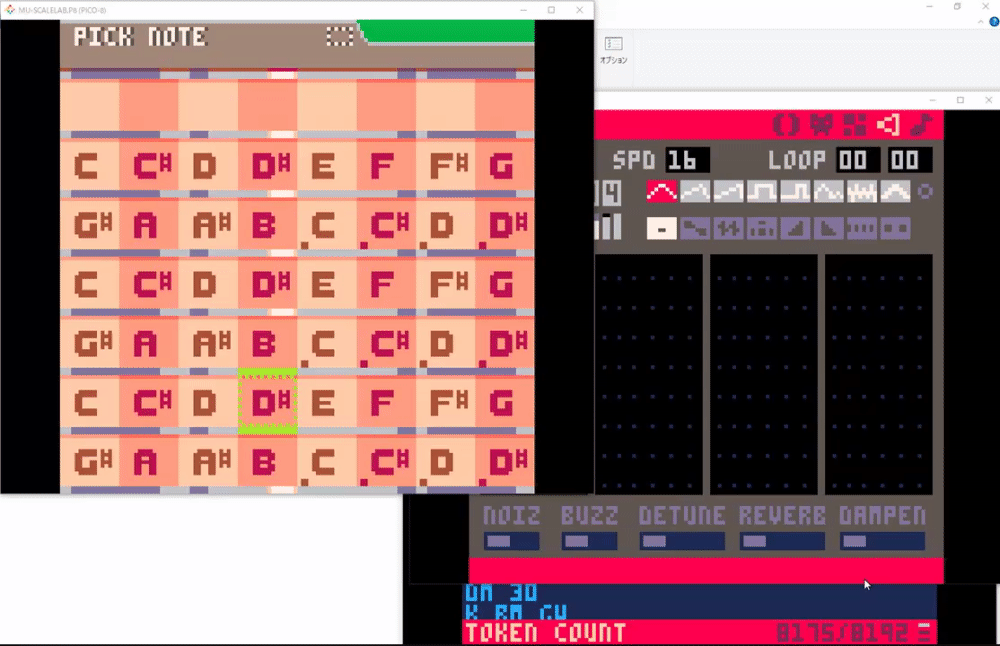



In what situations do you use these conversions?
hexnumber = '3xz'
--A
tonum(hexnumber,1) : 768 (0x0300.0000)
--B
tonum("0x"..hexnumber,4) : 0 (0x0000.0000)
--C
tonum('0x'..hexnumber) : -- NO VALUE --([nil]) |
Example
I want "nil" to be returned when I use a character as an identifier. Therefore, I use the "C" conversion.
hexstr = '108000789$'
hexval = TONORM(hexstr) -- Normalize the value [number boolian nil], otherwise it remains a string.
hextable = {}
if type(hexval) == 'string' then
foreach(split(hexstr, 3), function(v)
add(hextable, tonum('0x' .. v))
end)
end
-- Handle hexadecimal conversions without being converted to numbers by normalization.
-- Only the value of number is stored in the hextable.
-- "$" is not stored.
|








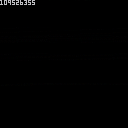
 1 comment
1 comment
